Workshops
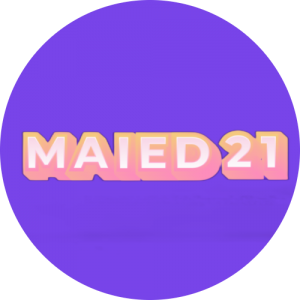
14/06/21 (9:00AM-5:00PM CEST | 3:00AM-11:00AM EDT)
This workshop aims at gathering new insights around the use of Artificial Intelligence (AI) systems and autonomous agents for education and learning leveraging multimodal data sources. The workshop is entitled Multimodal Artificial Intelligence in Education (MAIEd). It builds upon the CrossMMLA workshop series at the Learning Analytics & Knowledge Conference. The workshop calls for new empirical studies, even if in their early stages of development. It also welcomes novel experimental designs, theoretical contributions, and practical demonstrations which can prove the use of multimodal and multi-sensor devices “beyond mouse and keyboard” in learning contexts with the purpose of automatic feedback generation, adaptation, and personalisation in learning. Through a call for proposals, we seek to engage the scientific community in opening up the scope of AI in Education towards novel and diverse data sources.
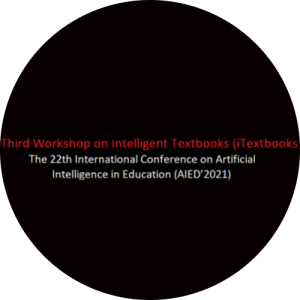
15/06/21 (14:00-18:30 CEST | 8:00AM-12:30PM EDT)
Textbooks have evolved over the last several decades in many aspects. Most textbooks can be accessed online, many of them freely. They often come with libraries of supplementary educational resources or online educational services built on top of them. As a result of these enrichments, new research challenges and opportunities emerge that call for the application of AIED methods to enhance digital textbooks and learners’ interaction with them. Therefore, we ask: How to facilitate the access to textbooks and improve the reading process? What can be extracted from textbook content and data-mined from the logs of students interacting with it? This workshop provide a platform for research contributions addressing these and other research questions related to the idea of intelligent textbooks. It aims at bringing together researchers working on different aspects of learning technologies to establish intelligent textbooks as a new, interdisciplinary research field.
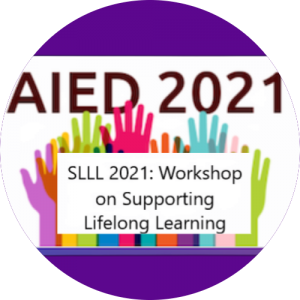
15/06/21 (18:00-21:00 CEST | 10AM-1PM EDT)
To achieve the theme of AIED 2021 “Mind the Gap: AIED for Equity and Inclusion“, advanced learning technology research needs to support lifelong learners with the knowledge and skills needed to succeed in a rapidly changing world. The proliferation of social media and the recent need for everyone to transit to online learning due to the pandemic have made millions of lifelong learners turn to online learning communities (OLCs). With the availability of big data about learners from the OLCs and the availability of the enabling technologies, opportunities arise to provide personalized support to learners. SLL 2021 workshop aims at providing a forum for researchers to critically discuss ways to advance research in supporting lifelong learning beyond the walls of traditional educational systems. The workshop will cover areas that address the application of advanced technologies like social recommendation, adaptive technologies, collaborative tools, persuasive strategies, learning analytics and educational data mining to support lifelong learners.
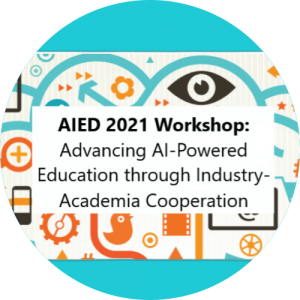
14/06/21 (16:30-01.30 CEST | 10:30AM-7:30PM EDT)
AI-enabled education tools have recently attracted attention for their potential to improve education quality and enhance traditional teaching and learning methods. These offerings are now being rolled out at scale in commercial and non-commercial products. Having achieved this level of maturity, standards for common interfaces, components, and processes serve as a foundation for new research and innovation while reducing the risk of adopting AI-based educational products and helping to avoid wasteful duplication of effort. Interoperability gained through thoughtfully developed standards makes it possible to reuse existing technologies and content so they can be integrated into existing educational ecosystems. This can reduce costs and accelerate advances in the field of AI in Education by enabling researchers and innovators to more easily test and evaluate new strategies and technologies through a wide variety of implementations in real-world environments generating large data sets. The standardization effort is also deeply connected with and informed by the AIED research in the corresponding areas.
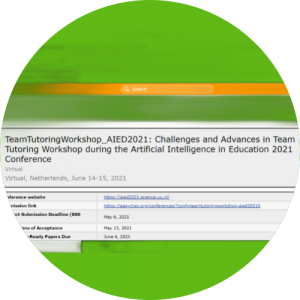
15/06/21 (15:00-19.00 CEST | 9:00AM-13:00PM EDT)
This workshop covers the approaches and challenges of team tutoring and collaborative learning in intelligent tutoring systems (ITSs). The development of team-oriented ITSs is a task that includes solving technological, instructional, and design-based problems. The goals of the workshop include providing a forum for researchers to discuss the progress that they have made in team or collaborative tutoring, discuss the approaches that they have taken, the challenges that they have encountered, and/or present theoretical models on innovative methodologies to address future work on team or collaborative tutoring. Topics of Interest Include but are not limited to: Natural Language Processing, Scaffolding and Pedagogical Modeling, Team Tutoring in Distributed Environments, Modeling Team Affect, Behaviors and Group Problem Solving, Working with Virtual Teammates.
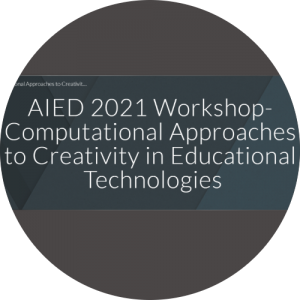
14/06/21 (09:00-13.00 CEST | 3:00AM-7:00AM EDT)
Creativity has been shown to promote students’ critical thinking, self-motivation, as well as mastery of skills and concepts. Despite their increasing prevalence in schools, most technological educational environments do not currently promote creativity in students’ interactions or support teachers’ ability to detect creative thinking by students. The workshop will provide a platform for researchers from different fields to share findings and discuss new research opportunities for combining AI and creativity in Education technologies. Importantly, we intend to invite a group of experts in creativity theory from the cognitive and psychological sciences to speak in the workshop. learning analytics towards creating technology-based environments that support creative thinking by students, and teachers’ abilities to understand and support such behavior.
